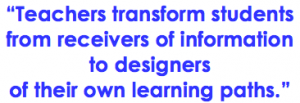Whether in the classroom or teachers’ professional development, the instructional goal should be transformational learning rather than transactional learning.
According to the Merriam-Webster Dictionary:
- Transaction: “an occurrence in which [something] is passed from one person . . . to another”
- Transformation: “a complete or major change in someone’s . . . appearance, form, etc.”
Much of today’s instruction, whether for students or teachers, involves someone having information and passing it on to another. The time and method are usually controlled by the instructor, and the instructor usually engages in some form of direct instruction with the hopes that the learner will now possess the information as well. However, I don’t believe that learning should be a matter of filling up a brain, particularly in today’s world when the internet acts as your external brain.
 I believe learning should be life-changing. Each learning experience should spark in learners that “aha” moment where they begin making connections, asking “What if?” questions that spur further learning, driven by their own “felt need” to master the content. As they learn, they should feel accomplished, capable, and intrigued to learn more.
I believe learning should be life-changing. Each learning experience should spark in learners that “aha” moment where they begin making connections, asking “What if?” questions that spur further learning, driven by their own “felt need” to master the content. As they learn, they should feel accomplished, capable, and intrigued to learn more.
As we shift teachers’ mindsets about the role of teacher, thus creating a transformation in them, school learning environments become more transformational. In the Learner-Active, Technology-Infused Classroom, learning begins with an overarching authentic, problem-based task that drives a “felt need” for learning. Teachers create, as Einstein on ce said, the conditions under which students learn. They design learning activities that are not necessarily assigned, but rather are available. They don’t dictate student action; they guide students in self-assessing and making effective decisions as to how they will learn. Teachers transform students from receivers of information to designers of their own learning paths.
ce said, the conditions under which students learn. They design learning activities that are not necessarily assigned, but rather are available. They don’t dictate student action; they guide students in self-assessing and making effective decisions as to how they will learn. Teachers transform students from receivers of information to designers of their own learning paths.
The road to transformational learning begins with transformational professional development. All educators hold mindsets (paradigms, mental models, etc.) about teaching. Your mindsets are formed from your past experiences; they reflect your beliefs and guide your actions. They drive your cause-and-effect thinking. No one can “tell” you to take on a new mindset; you have to engage in experiences that cause you to challenge your own mindset and form new beliefs, thus shifting your mindset.
Powerful mindsets include:
- All students really can achieve at high levels.
- Students can and should take charge of their own learning.
- The role of a teacher is to ensure that all students learn.
- Leadership means serving those whom one leads.
- Teaching means serving those whom one teaches.
- Through hard work and effort, you can build your intelligence and accomplish more. (Growth Mindset)
Transformational PD shapes teachers’ mindsets. It engages them in personal experiences that cause them to rethink their belief systems.
If you are planning PD for others, think about how you can move away from transactional activities to transformational activities. Decide what mindset you want to create and model it throughout your workshop.
Pursue that which is transformational!
